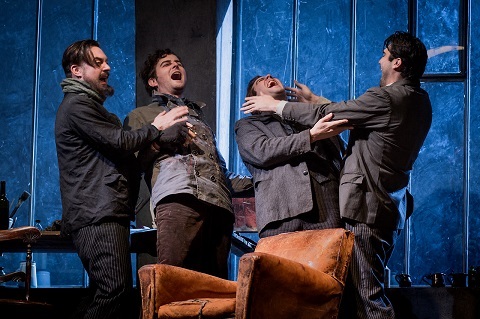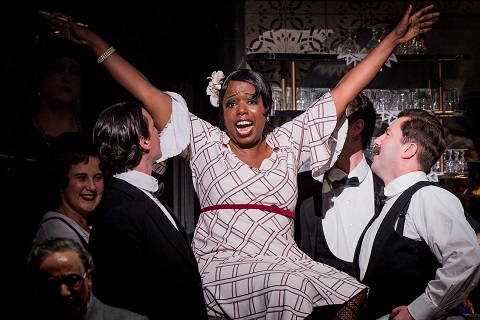Recently in Performances
English Touring Opera are delighted to announce a season of lyric monodramas to tour nationally from October to December. The season features music for solo singer and piano by Argento, Britten, Tippett and Shostakovich with a bold and inventive approach to making opera during social distancing.
This tenth of ten Live from London concerts was in fact a recorded live performance from California. It was no less enjoyable for that, and it was also uplifting to learn that this wasn’t in fact the ‘last’ LfL event that we will be able to enjoy, courtesy of VOCES8 and their fellow vocal ensembles (more below …).
Ever since Wigmore Hall announced their superb series of autumn concerts, all streamed live and available free of charge, I’d been looking forward to this song recital by Ian Bostridge and Imogen Cooper.
Although Stile Antico’s programme article for their Live from London recital introduced their selection from the many treasures of the English Renaissance in the context of the theological debates and upheavals of the Tudor and Elizabethan years, their performance was more evocative of private chamber music than of public liturgy.
Evidently, face masks don’t stifle appreciative “Bravo!”s. And, reducing audience numbers doesn’t lower the volume of such acclamations. For, the audience at Wigmore Hall gave soprano Elizabeth Llewellyn and pianist Simon Lepper a greatly deserved warm reception and hearty response following this lunchtime recital of late-Romantic song.
For this week’s Live from London vocal recital we moved from the home of VOCES8, St Anne and St Agnes in the City of London, to Kings Place, where The Sixteen - who have been associate artists at the venue for some time - presented a programme of music and words bound together by the theme of ‘reflection’.
'Such is your divine Disposation that both you excellently understand, and royally entertaine the Exercise of Musicke.’
‘And there was war in heaven: Michael and his angels fought against the dragon; and the dragon fought and his angels, And prevailed not; neither was their place found any more in heaven … that old serpent … Satan, which deceiveth the whole world: he was cast out into the earth, and his angels were cast out with him.’
There was never any doubt that the fifth of the twelve Met Stars Live in Concert broadcasts was going to be a palpably intense and vivid event, as well as a musically stunning and theatrically enervating experience.
‘Love’ was the theme for this Live from London performance by Apollo5. Given the complexity and diversity of that human emotion, and Apollo5’s reputation for versatility and diverse repertoire, ranging from Renaissance choral music to jazz, from contemporary classical works to popular song, it was no surprise that their programme spanned 500 years and several musical styles.
The Academy of St Martin in the Fields have titled their autumn series of eight concerts - which are taking place at 5pm and 7.30pm on two Saturdays each month at their home venue in Trafalgar Square, and being filmed for streaming the following Thursday - ‘re:connect’.
The London Symphony Orchestra opened their Autumn 2020 season with a homage to Oliver Knussen, who died at the age of 66 in July 2018. The programme traced a national musical lineage through the twentieth century, from Britten to Knussen, on to Mark-Anthony Turnage, and entwining the LSO and Rattle too.
With the Live from London digital vocal festival entering the second half of the series, the festival’s host, VOCES8, returned to their home at St Annes and St Agnes in the City of London to present a sequence of ‘Choral Dances’ - vocal music inspired by dance, embracing diverse genres from the Renaissance madrigal to swing jazz.
Just a few unison string wriggles from the opening of Mozart’s overture to Le nozze di Figaro are enough to make any opera-lover perch on the edge of their seat, in excited anticipation of the drama in music to come, so there could be no other curtain-raiser for this Gala Concert at the Royal Opera House, the latest instalment from ‘their House’ to ‘our houses’.
"Before the ending of the day, creator of all things, we pray that, with your accustomed mercy, you may watch over us."
The doors at The Metropolitan Opera will not open to live audiences until 2021 at the earliest, and the likelihood of normal operatic life resuming in cities around the world looks but a distant dream at present. But, while we may not be invited from our homes into the opera house for some time yet, with its free daily screenings of past productions and its pay-per-view Met Stars Live in Concert series, the Met continues to bring opera into our homes.
Music-making at this year’s Grange Festival Opera may have fallen silent in June and July, but the country house and extensive grounds of The Grange provided an ideal setting for a weekend of twelve specially conceived ‘promenade’ performances encompassing music and dance.
There’s a “slide of harmony” and “all the bones leave your body at that moment and you collapse to the floor, it’s so extraordinary.”
“Music for a while, shall all your cares beguile.”
The hum of bees rising from myriad scented blooms; gentle strains of birdsong; the cheerful chatter of picnickers beside a still lake; decorous thwacks of leather on willow; song and music floating through the warm evening air.
Performances

29 Nov 2018
Jonathan Miller's La bohème returns to the Coliseum
And still they come. No year goes by without multiple opportunities to see it; few years now go by without my taking at least one of those opportunities. Indeed, I see that I shall now have gone to Jonathan Miller’s staging on three of its five (!) outings since it was first seen at ENO in 2009.
Is there a degree of overkill, especially when it comes to a far from
adventurous production? Perhaps, although I am well aware of the (alleged)
reasons for a company performing the opera so frequently. Do they add up,
though? Judging by the number of empty seats at the Coliseum on this, the
first night, I am not sure that they do. Might that indicate that it is
time to give the work a rest or a new production? Again, perhaps, although
what in the present climate would be an adequate substitute for box-office
certainty? Perhaps there is no longer any such thing. Is that a bad thing?
For a company struggling with declining funding and years of mismanagement
- remember the self-styled ‘She-E-O’, Cressida Pollock, granting interviews
about how she liked to relax with a bottle of wine whilst wearing her
favourite training shoes, at the same time as attempting to sack the
chorus? - the answer would seem to be yes. On the other hand, might it
ultimately be a prod towards diversity of repertoire, towards taking
Puccini as something more artistically serious than a box-office certainty,
towards asking whether a performance in an often jarring English
translation vaguely ‘after’ Giuseppe Giacosa and Luigi Illica is really the
best way to ‘sell’ as well as to perform this work to a multicultural
audience? Perhaps. We shall see.
One very welcome aspect of this performance - and possible justification
for retaining the production a little while longer - was the opportunity it
granted, well grasped indeed, to a young cast including two of ENO’s
Harewood Artists: Nadine Benjamin and Božidar Smiljanić. Benjamin’s Musetta
is very much her own woman, no mere memory of other Musettas we have heard
- or claim to have heard (‘does not efface post-war memories of Dame
Ermintrude Heckmondthwike, “Ermie” we called her…’). Not that she
was different for the sake of it, quite the contrary, the crucial facets of
Musetta’s character coming through bright and clear, but fresh too, very
much an acquaintance as well as a reacquaintaince - and a vocal
acquaintance too. Smiljanić is likewise an able actor and impressed greatly
both as soloist, insofar as possible for a Schaunard, and in ensemble.
Likewise David Soar as Colline, his final-act moment something truly to
savour. Nicholas Lester’s Marcello was definitely a cut above the average,
rich and, where appropriate, ardent of tone, hinting cleverly at far more
to the character than we ever officially learn (surely so much of the trick
to a compelling Puccini performance). Simon Butteriss’s comedic turns as
Benoît and Alcindoro even had a doubter such as I consider the approach
(Miller’s, I suspect, more than the artist’s) perfectly justified.
 Nadine Benjamin and ENO cast. Photo credit: Robert Workman.
Nadine Benjamin and ENO cast. Photo credit: Robert Workman.
Last yet anything but least, our pair of star-crossed lovers, played by
Jonathan Tetelman and Natalya Romaniw, showed themselves (mostly) sensitive
artists who could yet project to the back of the largest of theatres.
(Alas, the Coliseum remains not the least of ENO’s problems, whatever
audience members ‘of a certain age’ might claim.) Romaniw’s Mimì proved
perhaps the more moving early on, but that is more likely a consequence of
the opera itself than of any great performative disparity; both certainly
moved in the final tragedy of the work’s final minutes. If only they had
not on occasion - under instruction, I suspect - played to the gallery,
treating their ‘big moments’ as stand-alone arias. The real culprit here, I
think, was Alexander Joel. His conducting of the ever-excellent ENO
Orchestra was incisive and mostly unsentimental, but he seemed incapable of
thinking - or at least projecting - a greater unity to each act, let alone
to the score as a whole. Of Puccini’s ‘symphonism’, we heard little or
nothing.
As for Miller’s production, ably revived by Natascha Metherell - who surely
deserved a curtain call - it is what it is. Paris updated to the thirties
looks beautiful, occasionally desperate too; Personenregie is
keen. As mentioned above, I am more reconciled to its comedy than I first
was. Moreover, I rather like - some do not - the glimpses we catch of
characters off the set as such, carrying on with their lives. Something a
little challenging or interesting, though, would surely not go amiss in the
future. As yet, few if any directors seem to have matched Stefan Herheim’s
challenge in his superlative Norwegian Opera production, let alone gone
beyond it. Will time tell? Perhaps.
Mark Berry
Puccini: La bohème
Marcello: Nicholas Lester; Rodolfo: Jonathan Tetelman; Colline: David Soar;
Schaunard: Božidar Smiljanić; Benoît: Simon Butteriss; Mimì: Natalya
Romaniw; Parpignol: David Newman; Musetta: Nadine Benjamin; Alcindoro:
Simon Butteriss; Policeman: Paul Sheehan; Official: Andrew Tinkler.
Director: Jonathan Miller; Revival director: Natascha Metherell; Set
Designs: Isabela Bywater; Lighting: Jean Kalman; Revival lighting: Kevin
Sleep; Chorus (chorus master: Mark Biggins) and Orchestra of the English
National Opera/Alexander Joel (conductor). Coliseum, London; Monday 26
November 2018.

